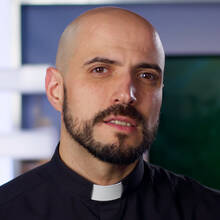A Reflection for the Fourth Monday of Advent
Like most things in 2020, this will be an Advent unlike any other. But each day, you can still take a few minutes to reflect on the coming of our savior at Christmas with short reflections on Scripture, written by the staff of America Media.
Subscribe to The Word in Apple Podcasts, Spotify or your favorite podcast player and never miss a reflection.
A Reading from the Gospel of Luke
Mary set out in those days
and traveled to the hill country in haste
to a town of Judah,
where she entered the house of Zechariah
and greeted Elizabeth.
When Elizabeth heard Mary’s greeting,
the infant leaped in her womb,
and Elizabeth, filled with the Holy Spirit,
cried out in a loud voice and said,
“Most blessed are you among women,
and blessed is the fruit of your womb.
And how does this happen to me,
that the mother of my Lord should come to me?
For at the moment the sound of your greeting reached my ears,
the infant in my womb leaped for joy.
Blessed are you who believed
that what was spoken to you by the Lord
would be fulfilled.”
Reflection
In today’s Gospel, Mary, pregnant with Jesus, rushes to visit Elizabeth, her 60-year-old relative, who, after years of being unable to conceive, is pregnant. We are told: “No sooner had Elizabeth heard Mary’s voice,” when John the Baptist, her unborn child, “leaped in her womb.”
Immediately, Elizabeth perceives her son’s excitement. At that moment, she understands that not only as a natural event, experienced by all mothers when they first feel their child kick-up against their stomach. But as an extraordinary sign that God is with her in that very ordinary moment of her day.
Without Mary telling Elizabeth that she is carrying Jesus, the Son of God. Elizabeth knows that, though she cannot see God, God is there with her—in Mary’s womb. This appears to leave Elizabeth puzzled, or even in disbelief, that God himself has come to her home.
As you bring yourself to feel God’s presence in your life, ask: “How does this happen to me, that the mother of my Lord should come to me?”
“How does this happen to me, that the mother of my Lord should come to me?”, Elizabeth asks Mary. It’s a reasonable question for Elizabeth to put to her cousin: How is it that Mary is to become the mother of God. But on another level, it’s an extraordinary question: Elizabeth is in awe of God’s presence and feels undeserving of such a special visit.
Elizabeth’s question is a question for us, too. Think about the times where, like Elizabeth, you have felt the Lord’s presence in your life. Remember what it felt like to know that God was with you. That’s the promise we’re given today. “Emanuel,” from the Hebrew word meaning God-is-with-us. And as you bring yourself to feel God’s presence in your life, in both ordinary and extraordinary ways, ask that same question that Elizabeth asked, as you wait for Jesus’ coming into our world at Christmas, in just a few days now.
“How does this happen to me, that the mother of my Lord should come to me?”
Pray
- Do you know when the Lord is coming into your life?
- Can you recognize God’s presence in your life, now?








